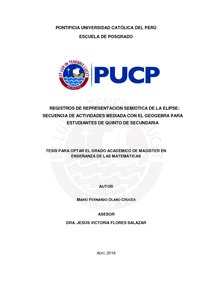Registros de representación semiótica de la elipse: secuencia de actividades mediada con el geogebra para estudiantes de quinto de secundaria
Abstract
La presente investigación tiene como objetivo analizar la coordinación de los diferentes
registros de representación semiótica, al favorecer la comprensión de la condición geométrica
de la Elipse en estudiantes de quinto año de educación secundaria, en una secuencia de
actividades mediada por el GeoGebra. La investigación se realiza con estudiantes de un colegio
particular limeño del último año de educación secundaria, cuyas edades están entre los 16 y 17
años. La problemática del estudio se da por los antecedentes de investigación que presentan los
inconvenientes que tienen los estudiantes de los últimos años de educación secundaria en
comprender el concepto de Elipse, como lugar geométrico, por el abuso por parte de los
docentes en el aspecto algebraico que prevalece sobre el aspecto geométrico. Nuestro interés es
abordar el estudio de la comprensión de la noción de Elipse, por medio de sus diferentes
representaciones. Para este estudio, utilizamos como marco teórico la Teoría de Registros de
Representación Semiótica y, en cuanto a la parte metodológica, tomamos algunos aspectos de
la Ingeniería Didáctica. Con respecto a la experimentación y análisis, elaboramos y aplicamos
una secuencia de dos actividades que son elaboradas con la intención que los estudiantes
coordinen los registros de lengua natural, figural, gráfico y algebraico, para comprender el
concepto de lugar geométrico de la Elipse. En la primera actividad, los estudiantes obtienen el
registro figural de la Elipse y coordinan el registro figural y lengua natural, mientras que en la
segunda actividad los estudiantes realizan la coordinación del registro gráfico y algebraico. Los
resultados que se obtienen muestran que los estudiantes logran coordinar los registros de
representación semiótica, lo cual les permiten comprender la noción de Elipse en sus diferentes
representaciones. This research has as its main objective to analyze the coordination of the different registers of
the semiotic representation favoring the understanding of the geometric condition of the Ellipse
in senior high school students in a sequence of activities mediated by the GeoGebra. The
research is conducted with students from a private school in Lima during the last year of
secondary education whose ages are between 16 and 17 years old. The problem of the study is
given by the research background that present the disadvantages that the students of the last
years of secondary education have in understanding the concept of Ellipse as a locus due to the
abuse on the part of the teachers in the algebraic aspect that prevails over the geometric aspect.
Our interest is to approach the study of the understanding of the notion of Ellipse through its
different representations. For this study we use the Theory of Records of Semiotic
Representation as a theoretical framework and, as for the methodological part, we take some
aspects of the Didactic Engineering. Regarding experimentation and analysis, we develop and
apply a sequence of two activities that are developed with the intention that students coordinate
the records: natural language, figural, graphic and algebraic, to understand the concept of the
locus of the Ellipse. In the first activity the students obtain the figural register of the Ellipse and
coordinate the figural and natural language records while in the second activity the students
perform the coordination of the graphic and algebraic record. The results obtained show that
the students manage to coordinate the registers of semiotic representation which allow them to
understand the notion of Ellipse in its different representations.
Temas
Matemáticas--Estudio y enseñanza (Secundaria)
Geometría--Enseñanza con ayuda de computadoras
Geometría--Enseñanza con ayuda de computadoras
Para optar el título de
Maestro en la enseñanza de las Matemáticas
Collections
The following license files are associated with this item:






